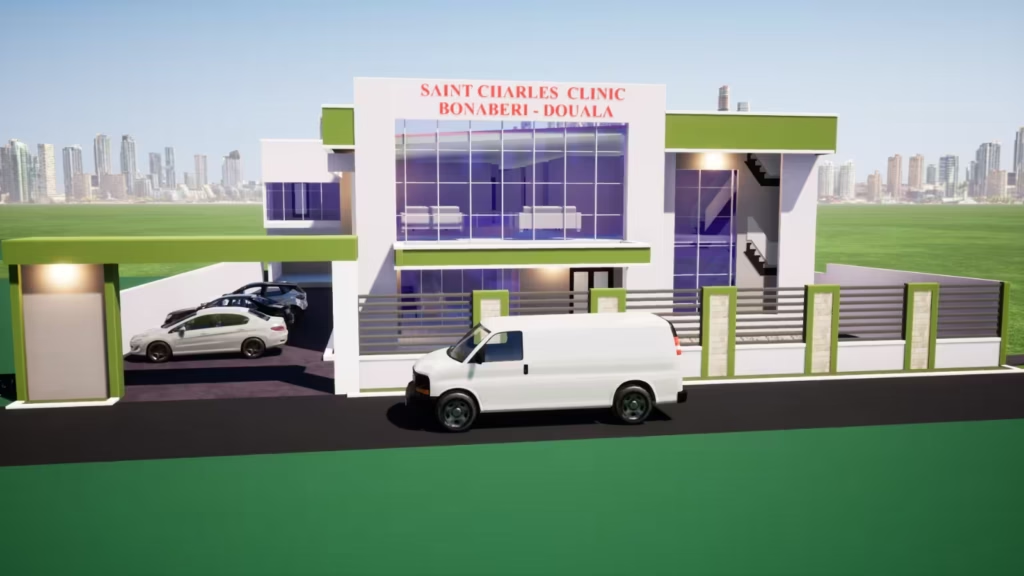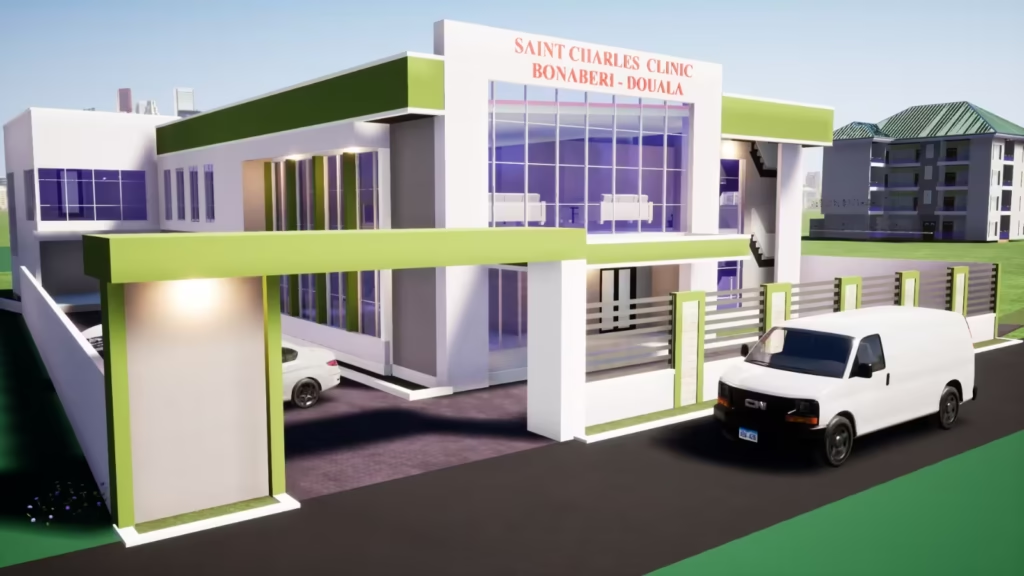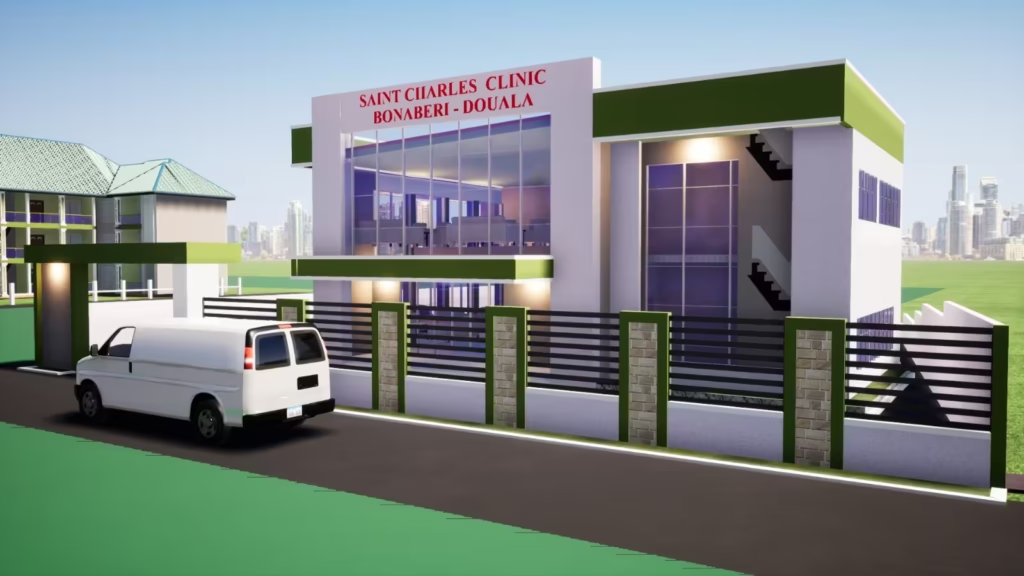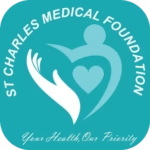6 Life-Saving Projects You Can Sponsor To Help Cameroon’s IDPs in Douala.
PROJECT 1. CLINIC INFRASTRUCTURE AND EQUIPMENT($500,000). 24 MONTHS
Description:
A civil war is not an event; it is a diagnosis. Since the eruption of Cameroon’s Anglophone crisis in 2016, a civil war born of linguistic and cultural divides, the country’s healthcare has crumbled under the weight of violence. Over 700,000 people have been displaced, and millions more live in poverty. For them, access to basic medical care is no longer a right but a gamble, where the stakes are life itself. Hospitals have been shut down. Doctors have fled. Families face a cruel truth: seeking care can be as dangerous as the illness itself. A mother in labour risks her life because there is no trained personnel to help her deliver safely. To become pregnant at all is now a gamble. Children with a fever wait in the hope that it will resolve on its own. A wound left untreated can turn fatal. Hypertension, diabetes, or asthma conditions that should be manageable become death sentences when there are no drugs, no doctors, no diagnostics.
It is against this backdrop that the St. Charles Medical Foundation (SCMF) stepped in to bridge the gap. You can further bridge this gap by picking any project to sponsor or donate to. We established the St. Charles Clinic in Bonaberi, Douala. A city where many Anglophone citizens have fled, known for its bilingualism and diversity. Here, we offer free and subsidised care to all: Anglophone refugees, Francophone locals, and the destitute alike. But our rented space holds us back. The clinic is cramped and under-equipped, missing not only critical departments like surgery, imaging, dentistry, a laboratory, and a pharmacy, but also many of the essential facilities that a modern health centre should provide. Every day, our staff must make heartbreaking decisions, choosing which cases to treat and which to turn away, simply because the resources are not there.
Saint Charles Medical Foundation seeks to establish and equip a permanent Saint Charles Clinic in Bonaberi, Douala, Cameroon. The facility will provide surgery, diagnostics, dental, pharmacy, and preventive services delivering free and subsidized healthcare to refugees, displaced persons, and impoverished locals affected by the ongoing civil conflict.
We are requesting $500,000 to finance the construction, equipping, and operational launch of a permanent Saint Charles Clinic in Bonaberi. This investment will ensure that displaced families, vulnerable children, and mothers can access life-saving care without cost being a barrier.



In the event of a shortfall, SCMF will continue to leverage its strong collaboration with donors and private investors who already support our mission of providing free and subsidised medical care.
Every dollar counts towards the realisation of the project.
PROJECT 2. RESTORING MOBILITY INITIATIVE (BUDGET $50,000). 6 MONTHS TO 2 YEARS
Description:
For survivors of Cameroon’s protracted Anglophone crisis, the end of gunfire has not meant the end of suffering. The wounds of war are profound and enduring, leaving behind a legacy of disability that is both a physical reality and a social life sentence. Some lost limbs to stray bullets or landmines. Others were crippled by untreated injuries when hospitals were stripped bare by conflict. Beyond the battlefield, poverty itself has been a silent weapon, where untreated infections, preventable diseases, and lack of prenatal care condemn people to permanent impairments. Today, it is estimated that over 1.2 million Cameroonians live with disabilities, with the displaced and impoverished families bearing the heaviest burden.
In these marginalised communities, disability carries a double burden: the struggle of immobility compounded by the curse of invisibility. Without something as basic as a wheelchair, a pair of crutches, or a hearing aid, and for some, without access to more advanced devices like prosthetic limbs, individuals are confined to the shadows of their homes. They become dependent on the mercy of others for their most basic needs, excluded from education, cut off from livelihoods, and erased from the social fabric of their communities. Their potential is locked away, not by their condition, but by the absence of resources. A child who cannot walk is denied school not for lack of intelligence, but for lack of a chair. A mother who cannot hear is left out of healthcare consultations, not because she lacks a voice, but because she lacks an aid to hear her own options.
At Saint Charles Medical Foundation, we believe mobility is not a privilege; it is the very foundation of freedom, dignity, and independence. That is why we are launching the Restoring Mobility Initiative: a project dedicated to breaking those invisible chains. Through this initiative, we will procure and distribute over 1,000 essential mobility and assistive devices to men, women, and children who are disabled by war or poverty. But this is more than providing equipment. It is about restoring agency: enabling a young man to work again, a child to return to school, a grandmother to worship with her community, and a survivor to reclaim their rightful place in the world.
Goals:
- To improve the quality of life and socio-economic integration of 1,000 conflict-affected persons with physical disabilities by providing them with appropriate mobility and assistive devices within a supportive and dignified framework.
- Identify and register 1,000 eligible beneficiaries through a fair and transparent process, ensuring equitable representation of women, children, and other vulnerable groups. Develop a secure beneficiary database to track needs, device allocation, and follow-up care.
- Deliver 1,000 durable, high-quality, and context-appropriate mobility and assistive devices to conflict-affected individuals living with physical disabilities. Prioritise devices designed for rough terrain and local environmental conditions, ensuring they remain functional and long-lasting in rural and urban crisis-affected settings.
The Restoring Mobility Initiative is driven by a simple but profound mission: to stand with the most vulnerable persons with disabilities, families living in poverty, and communities scarred by the Anglophone crisis. By restoring mobility, we restore dignity; by opening access to education, healthcare, and livelihoods, we create pathways out of poverty; and by promoting inclusion, we rebuild the social fabric of conflict-affected communities. Our mission is not only to deliver assistive devices, but to spark hope, independence, and resilience where it has been most threatened.
PROJECT 3. HEALTHY HEARTS, HAPPY HOMES. ( $44,500). 1 YEAR
Description:
The HEALTHY HEARTS, HAPPY HOMES project is a comprehensive and targeted initiative designed to provide essential medical care and treatment to vulnerable children between the ages of 0-5 who are affected by tropical health issues. These children, who are internally displaced persons (IDPs) or from very poor families, are disproportionately affected by illnesses such as malaria, typhoid, diarrhoea, and respiratory infections, which can have devastating consequences on their health, well-being, and future prospects.
The project aims to reach approximately 500 underprivileged children, providing them with access to quality medical care, treatment, and medication, as well as health education for their caregivers. By doing so, the project seeks to improve the health and well-being of these children, reduce the prevalence of tropical health issues among this population, and empower caregivers with the knowledge and skills necessary to prevent and manage these illnesses. The project’s comprehensive approach will involve collaboration with local healthcare providers and community-based organisations, ensuring that the project is tailored to the specific needs of the target population and is sustainable in the long term. The project team will consist of a project manager, healthcare professionals, community health workers, and a monitoring and evaluation officer, all working together to ensure the effective implementation of the project.
This project’s objectives are:
- To provide medical consultations, treatment, and medication to children affected by tropical health issues such as malaria, diarrhoea, and respiratory infections.
- To provide health education to caregivers on the prevention and management of tropical health issues, empowering them to take care of their children’s health
- To improve the health and well-being of underprivileged children affected by tropical health issues
- To reduce the prevalence of tropical health issues among children in the target population
- To increase knowledge and skills among caregivers on the prevention and management of tropical health issues
PROJECT 4. SOWING SEEDS. (6 MONTHS). $10,500
Description:
In the vibrant town of Mutengene, a family is struggling to make ends meet. Mrs Guedes Tagne Alvin Carole, a devoted mother of triplets, finds herself at the helm of a daunting challenge. Despite her unwavering dedication, the family is plagued by financial difficulties, a reality that threatens to undermine their very existence. The father, though hardworking, is engaged in unstable odd jobs that barely cover the family’s basic needs. The spectre of poverty looms large, casting a shadow over the future of these innocent children. St Charles Medical Foundation proposes to intervene in this narrative of struggle by empowering Mrs Guedes with a sustainable business venture.
We plan to establish a thriving enterprise in dried cooking spices, a market that holds promise and potential. By providing Mrs Guedes with the necessary tools, training, and support, we aim to equip her with the skills and resources needed to generate a steady income. This initiative will not only uplift the Guedes family but also create a ripple effect of hope and resilience in the community. Through careful planning, meticulous implementation, and ongoing support, we envision a future where Mrs Guedes is able to provide for her family’s needs, ensuring that her triplets and other children have access to quality education, healthcare, and a brighter future.
The impact of this project will be multifaceted, fostering economic stability, promoting self-sufficiency, and nurturing a sense of dignity and purpose. As the business grows and flourishes, it will serve as a beacon of hope, inspiring others to strive for a better life. With the support of St Charles Medical Foundation, Mrs Guedes and her family will be able to break free from the cycle of poverty and forge a path towards a more prosperous and fulfilling future.
Objectives:
The project aims to support Mrs Guedes and her family through the establishment of a business in dried cooking spices by the St Charles Medical Foundation. The objectives are as follows:
1. Economic Empowerment:
Provide Mrs. Guedes with a stable and sustainable income through the dried cooking spice business, enabling her to meet the basic needs of her five children, including the triplets, and improve their overall quality of life. A stable income will alleviate financial stress and anxiety, allowing Mrs. Guedes to focus on providing quality care for her children. This will have a positive impact on the children’s well-being, health, and education. With a reliable source of income, Mrs. Guedes will be able to afford nutritious food, adequate clothing, and necessary healthcare, leading to improved health outcomes and better academic performance. Moreover, financial stability will enable her to invest in her children’s education, providing them with opportunities for personal and professional growth.
2. Improved Livelihood:
Enhance the overall livelihood of Mrs Guedes and her family by increasing their financial stability, access to resources, and opportunities for economic mobility. By generating a steady income through the dried cooking spice business, Mrs Guedes will be able to afford basic necessities like food, clothing, and healthcare for her children. This will lead to improved health outcomes, better academic performance, and increased opportunities for the children. Moreover, financial stability will enable Mrs Guedes to invest in her children’s education, providing them with opportunities for personal and professional growth. As the family’s financial situation improves, they will be able to access better healthcare, education, and other resources, leading to a significant improvement in their overall livelihood.
3. Business Sustainability:
Ensure the long-term sustainability of the dried cooking spice business through effective management, marketing, and financial planning, enabling the business to generate a consistent source of income for Mrs. Guedes and her family. A sustainable business will provide a consistent source of income for Mrs. Guedes, enabling her to plan for the future and make investments in her children’s education and well-being. By ensuring the long-term sustainability of the business, Mrs. Guedes will be able to build a stable.
PROJECT 5. Motherhood Unplugged. 24 months $41,000
Description:
The project is a comprehensive and multifaceted initiative designed to provide holistic support to 20 first-time pregnant women who are underprivileged Internally Displaced Persons (IDP). These women have been disproportionately affected by the ongoing conflict in the Anglophone regions, which has led to significant challenges in accessing essential healthcare services, nutrition, and support. The conflict has resulted in the destruction of healthcare infrastructure, the displacement of healthcare workers, and limited access to healthcare facilities, making it difficult for pregnant women to receive the care they need.
The project aims to address the unique needs of these vulnerable women by providing a range of services, including prenatal care and health education, nutrition support and counselling, emotional support and counselling, parenting education and support, and access to essential resources and services. Prenatal care will be provided by trained healthcare professionals and will include regular check-ups, health monitoring, and interventions as needed.
Health education will focus on promoting healthy behaviours, such as proper nutrition, hygiene, and breastfeeding practices.
Nutrition support and counselling will be provided to ensure that these pregnant women receive the necessary nutrients for a healthy pregnancy. This will include the provision of nutritional supplements, counselling on healthy eating habits, and support for breastfeeding.
Emotional support and counselling will also be provided to address the psychological trauma and stress experienced by these women. This will include individual counselling sessions, support groups, and peer mentoring.
Parenting education and support will be provided to prepare women for motherhood and to promote positive parenting practices. This will include education on childcare, child development, and parenting skills.
Access to essential resources and services will also be facilitated, including healthcare services, social services, and community resources.
By providing these services, the project seeks to improve maternal and child health outcomes, enhance the knowledge and skills of pregnant women, reduce stress and anxiety, and increase
Project Objectives and Expected Outcomes
The project aims to provide comprehensive support to 20 first-time pregnant women in IDP camps, ensuring their physical, emotional, and social well-being, and enabling them to care for their newborns effectively. The specific objectives and expected outcomes of the project are:
1. Improve Maternal Health Outcomes:
Provide essential healthcare services, including prenatal care, skilled birth attendants, and emergency obstetric care, to reduce the risk of maternal mortality and morbidity. This objective aims to ensure that pregnant women receive timely and adequate medical care, thereby reducing the risk of complications during pregnancy and childbirth. The project will provide access to prenatal care, skilled birth attendants, and emergency obstetric care, which are essential for maintaining good health and preventing maternal mortality and morbidity. – Expected Outcome: Reduced maternal mortality and morbidity rates, resulting from improved access to prenatal care, skilled birth attendants, and emergency obstetric care.
2. Enhance Nutrition and Food Security:
Provide nutritious food, clean water, and sanitation facilities to prevent malnutrition and related health problems. This objective aims to ensure that pregnant women have access to a balanced diet, clean water, and proper sanitation, which are essential for maintaining good health and preventing malnutrition-related complications. The project will provide nutritious food, clean water, and sanitation facilities to pregnant women, which will help to prevent malnutrition and related health problems. Expected Outcome: Improved nutrition and food security for pregnant women, resulting from access to nutritious food, clean water, and sanitation facilities.
3. Promote Emotional Well-being:
Provide emotional support and counselling to address psychological trauma and stress, and promote mental health and well-being.
Project 6. From Crisis to Triumph. (5 years) $ 40,000
Description:
This project aims to provide comprehensive educational support to 10 internally displaced children from the Anglophone regions of Cameroon, enabling them to attend secondary school for five years. The initiative seeks to address the significant educational disruptions caused by the ongoing crisis, which has resulted in widespread displacement and compromised the well-being and prospects of thousands of children.
The project will offer a scholarship program to cover tuition fees, school supplies, and other educational expenses, ensuring that the selected children can access quality education without financial burdens. Additionally, mentorship and support services will be provided to promote academic, social, and personal growth, helping the children to cope with the trauma of displacement and build resilience. Regular monitoring and assessments will be conducted to ensure the children’s academic progress and well-being, identifying areas for improvement and informing project adjustments.
The project will also foster community engagement, collaborating with local schools, organisations, and stakeholders to promote a supportive environment and ensure the long-term sustainability of the initiative. The expected outcomes of the project include improved educational outcomes, enhanced psychosocial well-being, and increased future opportunities for the supported children. By providing educational support and promoting holistic development, this project aims to make a meaningful difference in the lives of these children, contributing to the rebuilding of their communities and the broader region.
The project will run for five years, with an estimated budget of, which will cover tuition fees, school supplies, mentorship and support, and monitoring and evaluation. Through this initiative, we aim to provide a stable and secure future for the selected children, empowering them to reach their full potential and become active contributors to their communities.
Rationale:
This project aims to address the educational needs of internally displaced children from the Anglophone regions by providing comprehensive support to enable them to attend secondary school.
By promoting educational stability and holistic development, the project seeks to improve the children’s future prospects and contribute to the rebuilding of their communities. The project is grounded in the understanding that education is a fundamental human right and a critical factor in promoting social and economic development.
The project’s objectives are aligned with the Sustainable Development Goals (SDGs), particularly Goal 4, which aims to ensure inclusive and equitable quality education and promote lifelong learning opportunities for all.
By providing a safe and supportive learning environment, the project aims to help the affected children recover from the trauma of the conflict and build a more stable and secure future.
By providing a detailed understanding of the Anglophone crisis and its impact on education, this project aims to contribute to a more nuanced understanding of the complex issues at play and to inform effective solutions that address the needs of affected children.
The project’s focus on education as a critical factor in promoting social and economic development reflects a commitment to building a more sustainable and equitable future for the affected communities.
The project is expected to achieve the following outcomes:
1. Improved Educational Outcomes:
The supported children will demonstrate improved academic performance and increased educational attainment.
2. Enhanced Psychosocial Well-being:
The children will exhibit improved emotional well-being, confidence, and resilience.
3. Increased Future Opportunities:
The children will have improved prospects for further education, employment, and personal development.
4. Stronger Community Engagement:
The project will foster a sense of community engagement and support, promoting a supportive environment for the beneficiaries. By achieving these outcomes, the project aims to make a meaningful difference in the lives of the internally displaced children, promoting their educational stability, psychosocial well-being, and holistic development.
Together With Your Support, We Can Turn These Projects Into a Reality.
As our founder always says, nothing is too small when given with love.
Sign Up For Our Newsletter
Never miss any update from us!
